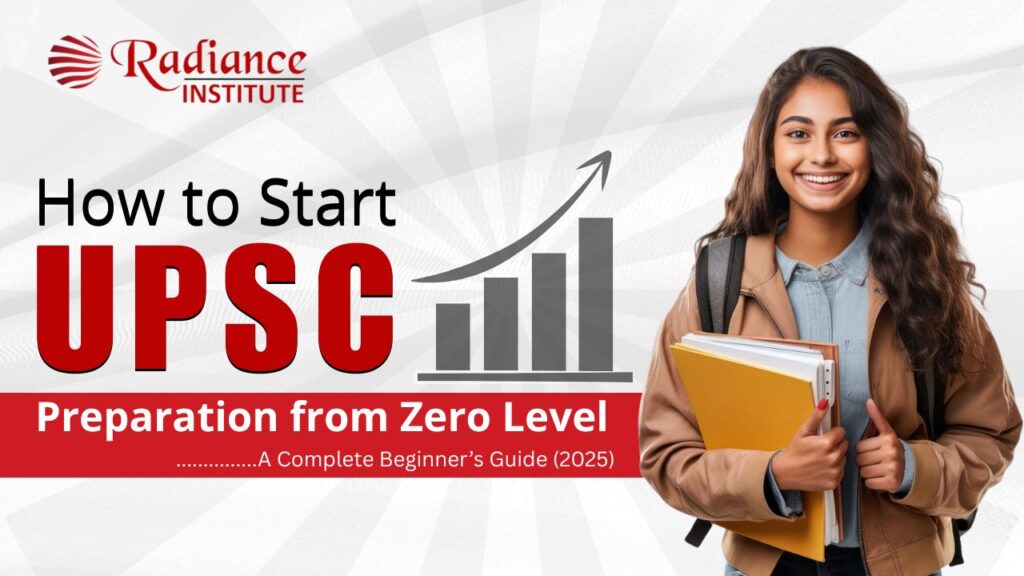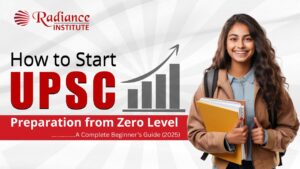How to Start UPSC Preparation from Zero Level: A Complete Beginner’s Guide (2025)

“More than 10 lakh aspirants fill the UPSC form every year, but less than 1% actually clear it.”
Now that’s not meant to scare you, but it sure as hell makes you think—am I doing this right from the start?
If you’re, wondering how the heck do I even begin UPSC journey?, well you’re not alone. This guide is for all of you who have no clue where to start, feeling overwhelmed by the flood of “toppers’ strategies,” and just want someone to break it down in plain, and simple language so you can understand. So, here’s the complete beginner’s guide to How to Start UPSC Preparation from Zero Level in 2025.
Understanding the UPSC Exam Structure
Okay, before you even pick up an NCERT, you need to know what you’re getting into. UPSC (short for Union Public Service Commission) conducts the Civil Services Examination to recruit IAS, IPS, IFS, and other important officers. But this it is not just any exam—it’s one of the toughest exam in India, maybe even the world.
Now, this exam happens in three stages:
- Prelims – Objective-type questions, just to screen you out.
- Mains – Long-form answers, essay writing, optional subjects… you need real depth here.
- Interview (Personality Test) – A panel that interview you about your life, thoughts, opinions… and your confidence.
Each stage has its own rules, its own pressure. So if you’re serious about learning how to start UPSC preparation from zero level, then understanding this format is step zero. You can’t skip it.
Breaking Down Prelims, Mains & Interview
Let’s look at each sections:
- Prelims:
- Two papers: General Studies (GS) and CSAT.
- GS covers everything from History to Polity to Current Affairs.
- CSAT is basically aptitude—maths, reasoning, English.
- It’s qualifying. You just need to cross a cutoff (but don’t take it lightly).
- Mains:
- 9 papers in total. Yes, nine.
- Includes 4 GS papers, 2 Language papers, 1 Essay, and 2 Optional Subject papers.
- It’s all about analytical skills, writing style, depth of understanding.
- Interview:
- 275 marks of pure personality and perception.
- No fixed syllabus. They can ask you anything.
- You need to be calm, smart, and genuine.
Pretty tough, huh? But don’t worry. Even if you’re starting from absolute scratch, knowing this basics gives you direction.
Who Can Apply? (Basic Eligibility Criteria)
These are the basic eligibility criteria for the exam
- Nationality: Indian (for IAS & IPS).
- Age: Between 21 to 32 years (for General category).
- Attempts: 6 (for General), 9 (for OBC), unlimited till 35 years for SC/ST.
- Education: Any graduate from a recognized university.
That’s it. No need to be a topper or gold medallist or IITian (although some of them are here too). Just basic graduation is enough. So if you’re starting late or changing paths, it’s still totally possible.
Optional Subjects in UPSC Exams
Now this right here? It’s a game-changer. You need to choose your optional subject for Mains, and it carries 500 marks. That’s a lot, considering how tightly scored the mains papers are.
There are over 25 subjects—History, Geography, Sociology, PSIR (that’s Political Science & International Relations), Anthropology, Literature options (Hindi, English, Tamil, etc.), and many more.
Choose wisely. Some go with what they studied in college, others pick subjects with high overlap with GS papers. But more on that later.
How to Start UPSC Preparation from Zero Level?
This is the heart of it, yeah? You’re starting from zero. With no clue. Maybe not even a good internet connection. Relax. You got this.
Let’s break it down.
Know the Syllabus
Download the official syllabus from the UPSC website. Print it, stick it on your wall, memorize it, sleep with it under your pillow if you have to. Every single topic you study should connect back to the syllabus.
Pro tip: Keep a highlighter handy. Mark what you’ve covered as you go. That visual progress feels so good.
Start with NCERTs
Everyone says it for a reason. NCERTs (from Class 6 to 12) are gold for beginners. They’re simple, clear, and perfect for building your base.
- History: Start with 6-12th NCERTs, then move to Bipin Chandra.
- Geography: Old NCERTs are better. 11th and 12th are crucial.
- Polity: Laxmikanth is the holy grail here, but do NCERTs first.
- Economy: Start with Class 11 & 12, then go to Ramesh Singh or Sriram notes.
- Science: Basic understanding from Class 6-10 is enough for GS.
Don’t rush it. Enjoy the process. You’re laying the foundation of your UPSC house.
Essential Resources for Beginners (not just books)
- Books: NCERTs, Laxmikanth, Spectrum for Modern History, Ramesh Singh for Economy.
- Websites: PIB (Press Information Bureau), PRSIndia, UPSC.gov.in.
- YouTube: There’s tons of free content out there. But be picky. Don’t binge random stuff.
- Newspapers: The Hindu or Indian Express. Don’t just read, make notes.
- Mock Tests: Join a test series after 3-4 months of study. Helps you assess where you stand.
Also, podcasts and Telegram groups are lowkey helpful—but don’t get lost in the chaos.
Crafting a Study Plan That Works For You
Don’t copy others’ timetables. Your life’s different. Instead, try:
- Studying in blocks: 2-3 hours at a time, not 8-hour marathons from Day 1.
- Mixing subjects: Like History + CSAT, or Polity + Newspaper reading.
- Weekly goals: “Finish Class 6-8 History NCERTs this week” is way better than “study hard.”
Try keeping Sundays to relax and revise what you read, watch an IR documentary, whatever works.
Call it a battle strategy, not a boring schedule. And yes, give it flexibility. Life happens.
Note: IR documentary is a non-fiction film or series that explores international affairs, diplomacy, global conflicts, foreign policy, or geopolitical themes.
Newspapers & Current Affairs, Where to Begin?
Reading newspapers can be boaring but you need it for your preparation here’s how you can do it.
- Start slow: 30 mins daily. Highlight important editorials, events, schemes.
- Make notes: Not the whole article—just bullet points of issues, reasons, impacts.
- Use monthly compilations: If you miss a day, don’t panic. There are several platform that release monthly summaries.
And remember—don’t read crime news or movie gossip unless it’s for stress relief.
So… How to Start UPSC Preparation from Zero Level – Summary
If you’re still reading, let’s recap some stuff real quick:
- Understand the exam structure inside-out.
- Make sure you understand the syllabus and print it out.
- Begin with NCERTs, no shortcuts.
- Choose your optional subject smartly.
- Read newspapers daily, make short notes.
- Create a study plan that you can actually follow.
- Take breaks, stay sane, and stay off toxic topper comparison rabbit holes.
Look, there’s no magic strategy. But starting right? That’s half the battle.
Remember this exam is hard. Not because of the syllabus, but because of the mindset. Self-doubt will knock often. You’ll feel behind. People will ask “UPSC? Abhi tak clear nahi hua?” Ignore the noise.
You’re learning not just about India—but about yourself. That growth? That’s priceless.
Ready to Dive In?
You don’t need to be a genius. Just consistent. Even if you’re starting at zero, you’re not alone. Thousands are doing it too—and many are cracking it.
So go ahead. Grab that first NCERT, open today’s newspaper, scribble out your plan.
Because if you start now, your future self will thank you for not waiting till next month.
Let this be your first step into the world of UPSC. And who knows—maybe 2025 is your year.
FAQ: How to Start UPSC Preparation from Zero Level
1. I have no background in humanities. Can I still crack UPSC?
Yes, 100%, Many toppers come from engineering, medicine, and commerce backgrounds. UPSC tests general understanding and analytical skills, not your degree. With the right approach and consistency, anyone can crack it—arts background or not.
2. What’s the very first step to start UPSC preperation?
Start by reading and understanding the UPSC syllabus (both Prelims & Mains). Then grab the NCERTs (Class 6–12) for basic concepts. Also, print the syllabus and keep it handy—it’ll guide your prep like a GPS.
3. How much time does it take to prepare from zero level?
On average, it takes about 12 to 18 months of solid preparation. But it varies based on your background, study hours, and strategy. Some do it in a year, others take longer. The key? Consistency > Speed.
4. Do I need to join a coaching institute?
Not necessarily. With free online resources, YouTube, PDFs, and test series, many aspirants prepare entirely on their own. Coaching can help with guidance and discipline, but it’s not mandatory.
5. Which newspapers should beginners read?
The Hindu and Indian Express are the top picks. Stick to editorials, international news, polity, and environment sections. If that feels heavy initially, start with monthly current affairs compilations to get into the flow.
6. When should I choose my optional subject?
Once you’re familiar with the basics and have looked into 2–3 subjects you’re comfortable with. Ideally, within the first 2-3 months of starting prep. Your optional can make or break your final rank—so choose very wisely.
7. How do I stay motivated during UPSC prep?
- Set small, achievable goals.
- Take breaks without guilt.
- Keep reminding yourself why you started.
And yeah, UPSC prep is a marathon, not a sprint. Burnout is real—don’t let hustle culture ruin your mental game.
8. Can working professionals prepare for UPSC?
Yes, many working aspirants crack it, You’ll need a tight study schedule, smart resources (like podcasts, mobile notes), and weekend revisions. It’s tough, but totally doable with dedication.
9. Is English medium better than Hindi or vice versa?
There’s no “better”—choose the language you’re most comfortable thinking and writing in. Many Hindi and regional language aspirants clear UPSC every year. What matters is clarity of thought, not the language.
10. Is coaching material enough or should I read standard books too?
Coaching notes can summarize things, but standard books (like Laxmikant, Spectrum, NCERTs) give you depth and context. Ideally, use both. First, understand concepts from books, then revise with notes.
Contact Us

How to Start UPSC Preparation from Zero Level: A Complete Beginner’s Guide (2025)
How to Start UPSC Preparation from Zero Level: A Complete Beginner’s Guide (2025) “More than 10 lakh aspirants fill the UPSC form every year, but

